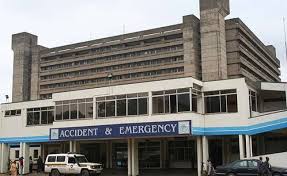
 The Kenyatta National Hospital /FILE
The Kenyatta National Hospital /FILE
Health CS Adan Duale on Thursday said the ministry is fast-tracking the procurement of a replacement for a new cancer treatment machine after the existing one broke down.
Kenyatta National Hospital (KNH) in a statement on Wednesday confirmed the Linear Accelerator (LINAC) Elekta machine, a vital piece of equipment in the treatment of cancer patients, had experienced an unexpected technical failure.However, the Cobalt radiotherapy machine at the hospital remains fully operational, and patient referrals are ongoing to ensure continued care.
"We apologise for the inconvenience caused by the breakdown of the LINAC cancer treatment machine at Kenyatta National Hospital," Duale said.
He reiterated the government's commitment to restoring full oncology services promptly.
“We recognise the critical importance of uninterrupted oncology services, and we immediately activated referral protocols to safeguard patient care,” acting Chief Executive Officer William Sigilain said.
"KNH is also pleased to inform the public that the Cobalt radiotherapy machine, which had previously broken down, has now been fully restored and is operational," he said.
KNH admitted that the disruption of critical oncology services has happened at a time when demand remains high.
In the meantime, KNH has promised the public that the procurement process for a replacement for the LINAC machine is being fast-tracked through the appropriate tendering procedures to restore full oncology services at the earliest possible time.
“We remain fully committed to delivering world-class, compassionate care. We appreciate the patience and understanding of our patients and stakeholders.”
The hospital pledged to provide regular updates as it works to restore full oncology services.
On January 16, 2025, a five-year analysis indicated that children treated for a rare but aggressive blood cancer at the KNH had one of Africa’s highest survival rates.
In many African countries, only about three to six children treated for the cancer, Burkitt lymphoma (BL), survive beyond five years.
However, an analysis of records of children treated at KNH between January 1, 2016 and December 31, 2022, indicates that seven out of every ten survived.
On May 6, 2025, KNH made history with the world’s first Transhumeral TSR surgery, which involved restoring sensation to the stump of an amputated left arm.
The medical procedure was successfully done on a 22-year-old software engineering student, Moses Mwendwa, on April 29, 2025.












